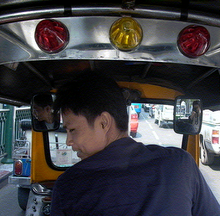On Monday, Institute for Ecosoc Rights (Ecosoc) organized a workshop on public participation in urban planning, inviting various stakeholders of Jakarta from citizens, professionals, academics, activists, and government officials. A brief summary of the workshop was covered in this Kompas article [1].
What I found interesting from the workshop was the comments that were brought up by the audience. The participants representing stakeholders of the city were skeptical and defensive of each of their roles in the city.
Academics and researchers questioned Ecosoc’s decision to use Bangkok as comparison instead of other best practices from within Indonesia, mentioning Jakarta as the more diverse and complex case, and the fact that Bangkok’s culture and political system was different than Jakarta’s. Does it mean that comparative studies can’t be useful? Does it mean that Jakarta is utterly hopeless?
Activists and community representatives mentioned that most members of the urban poor community didn’t know how they could participate, and most of them were not interested to participate until they were encountered by problem such as eviction. Does it mean they can’t be informed? Does it mean they can’t understand the importance of civil society?
Government officials on the other hand said that most members of the community were so used to being colonized that they had mentality that would make it difficult to progress. Well, does it mean that the government can’t do anything to educate the community?
Two issues could be underlined. Firstly is that most of Jakarta’s stakeholders would rather avoid taking responsibility and ownership of the problem of the city. Most would rather blame it on other parties, rather than thinking what each could do to contribute. Secondly, the feeling of distrust exists among different stakeholders. Where would you start?
Added:
[1] Note that I wasn't aware there was a journalist in the audience. He did not interview me and I can't remember saying the words within the quotation marks. All that was written in the article was just the journalist's own interpretation. Another example of bad journalism?
Wednesday, February 21, 2007
Subscribe to:
Post Comments (Atom)




2 comments:
this is an interesting problem.
you seem to have a freerider problem - i.e. residents have any incentives to spend the energy and time in trying to fix things until they have something big to lose personally.
you have govt officials whose incentives aren't aligned with the greater good.
and then you have academics who want to be seen to be clever and will shoot down anything in order to show how smart they are :) [bloody academics!]
if I were to suggest anything, it would be to make it easier and quicker for residents to complain and collect their problems under one roof and become advocates for them. that would lessen the freerider problem, and make it costlier for officials to ignore complaints.
[of course it's easier said than done!]
Hi John,
Yes, that's what we plan to do. But with such a start, it'll take a long way to go. Hopefully we'll get there at the end though, at the end of the research and series of workshops and seminars.
Post a Comment